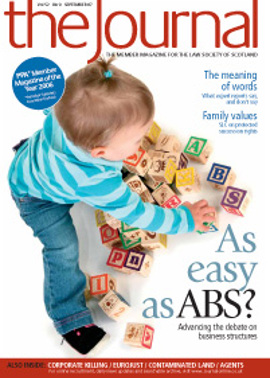The men in black

Tevez: end of the road
In the June issue of the Journal (p 44) we covered the initial dispute involving Carlos Tevez and West Ham United FC, and noted that matters surrounding the player’s transfer had been referred to arbitration by Sheffield United FC. Sheffield were unhappy that West Ham had been fined and not deducted points for a double breach of the league rules. The arbitration has recently concluded.
The three-man panel who heard the arbitration was headed by retired High Court judge Sir Philip Otton. The panel, who did not have the power to change West Ham’s punishment but could have ordered a new independent commission to judge the case, issued their ruling in July, concluding that whilst Sheffield United would not normally have been allowed to dispute another club’s punishment, there were “exceptional circumstances” because of their relegation, which affected their membership of the FA Premiership and should entitle them to dispute the decision of the original disciplinary panel.
Although the arbitration tribunal said it had “sympathy” with Sheffield, who were relegated while West Ham had been “deliberately deceitful” and yet remained in the Premiership, they concluded that the decision to fine West Ham could not ultimately be ruled to be wrong. The tribunal applied the principles of judicial review and determined whether the decision was “irrational or perverse”. In noting that this was a very strict test and very difficult to satisfy, it concluded that it was not possible for it to find that the decision of the original disciplinary panel, taking into account all of the factors involved in the case, was irrational or perverse. Subsequent High Court proceedings raised by Sheffield United saw the club refused leave to appeal the decision of the arbitration tribunal. With that, their relegation was beyond contest and West Ham’s place in the top flight was assured.
Heinze and the “undertaking”
Shortly following the conclusion of the Tevez saga, another player transfer issue arose, this time involving Gabriel Heinze, who wished to move from Manchester United to Liverpool FC. As with Tevez, arbitration was sought. Under the Premiership’s rules, disputes between players and their clubs can be the matter of arbitration (similarly to the rules of the Clydesdale Bank Premier League in Scotland). The intention is that an internal dispute resolution mechanism for players and their clubs can assist in keeping disputes from the tribunals or courts.
Heinze sought arbitration because Liverpool wanted to sign him, and being apparently keen to join Liverpool, Heinze sought to be transferred to them. Manchester United did not wish to transfer Heinze to Liverpool, who they perhaps regarded as their most significant historic rival. Liverpool had bid £6.8 million for Heinze, who claimed that he had an undertaking from United to release him from his contractual obligations and transfer his registration if a bid of £6.8 million was made for his services. United claimed that this undertaking related only to international transfers and not to domestic transfers, including those to their closest rivals.
The matter was ultimately resolved in favour of United by an FA Premiership arbitration tribunal, following a hearing at which evidence was given by Sir Alex Ferguson (United’s manager) and many others. The tribunal concluded that the undertaking provided to the player related only to international transfers, in keeping with what it was claimed the player was told in discussions, and the club’s established transfer policy of not selling to rivals. It also considered that the undertaking was no more than an agreement to agree. The arbitration panel’s verdict read (in part):
“The Premier League Board-appointed panel has heard submissions of evidence from both parties and has ruled to dismiss the player’s case. The hearing concluded that the nature and intention of the disputed 13 June 2007 letter, especially when taken in context of verbal discussions and Manchester United FC’s transfer policy, was unambiguous in that it envisages only an international transfer.
“Furthermore, the hearing finds the letter constitutes an ‘agreement to agree’ and did not create an obligation or binding agreement for the club to transfer the player to any particular club.”
Key player
In addition to highlighting the usefulness of arbitration in sport (especially where, as in these two disputes, the adjudicators were appointed from within the sport to determine the issues), it also serves as a timely reminder to those drafting similar undertakings in sport that precision and clarity are vital to avoid the need for arbitration. Shortly following the decision, Heinze left Manchester United for Real Madrid, avoiding the need for an appeal to be heard.
Bruce A Caldow, Partner, Harper Macleod LLP
In this issue
- TUPE: stay your hand
- Nothing new under the sun
- ABS - Actual Benefit Soon?
- A chance to succeed?
- Killing in company
- Longer arm of the law
- Agents... a commercial view
- Bad language
- Remote gambling - all bets off?
- What makes a team?
- Managing the fraud risk
- Duties to the court
- Copycats: another nine lives?
- Activity in the courts
- Invoking the UCCJEA
- The men in black
- Scottish Solicitors' Discipline Tribunal
- Website reviews
- Book reviews
- Big names, big issues for annual conference
- Meet the Committee: Cameron Ritchie
- Contaminated land - where are we now?






